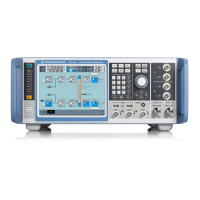Configuring the Signal in the RF Domain
R&S
®
SMW200A
469User Manual 1175.6632.02 ─ 16
Sweep steps
In the following, you see how the sweep steps are calculated depending on the defined
spacing mode. The formulas show a frequency sweep, but apply to the level settings in
the same way.
The step width is added to the current value, to get the subsequent sweep step.
With linear scaling, the next frequency is calculated according to:
f
2
= f
1
+ step_lin
In the logarithmic scaling, the step width is determined in per cent, as a constant frac-
tion of the current frequency.
Successive frequencies are calculated as follows:
●
For f
STARt
< f
STOP
f
2
= f
1
*(1 + step_log/100)
If f
2
> f
STOP
, then f
2
= f
STOP
●
For f
STARt
> f
STOP
f
2
= f
1
/(1 + step_log/100)
If f
2
< f
STOP
, then f
2
= f
STOP
With "Shape = Triangle", the frequency values on the slope from f
STOP
to f
STARt
are the
same as on the slope from f
STARt
to f
STOP
.
If you specify the number of steps within the sweep range, the step width is adjusted
according to the following correlation:
●
For linear sweeps and f
STARt
< f
STOP
POINts
frequency
= ((f
STARt
- f
STOP
)/step_lin) +1 = (f
SPAN
/step_lin) + 1
●
For logarithmic sweeps and f
STARt
< f
STOP
POINts
frequency
= ((log f
STOP
- log f
STARt
)/log step_log) +1
If step_log changes, the value of POINts is adjusted. The f
STARt
and f
STOP
values are
retained.
7.6.2.2 Sweep Signal Shapes
To generate a sweep signal, the variable parameter changes by a predefined wave-
form.
The R&S SMW supports the following waveform shapes:
●
Sawtooth
The sweep sequence resembles a sawtooth. One sweep runs from start to stop
frequency, or level value respectively. Each subsequent sweep starts again at the
start value.
Varying the RF Signal in List or Sweep Mode

